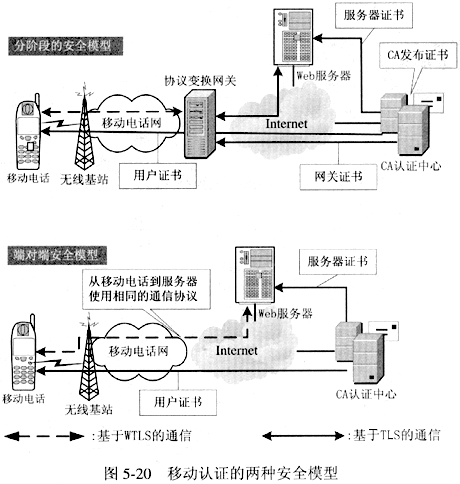【问题1】 由于面向3G移动电话的电子商务网站看不到用户进行销售服务,因此,对用户身份进行认证是必要。通常,在Internet中进行电子签名的认证过程如下: ①文件的发送者将要发送的文件生成 (1) ; ②用发送者的 (2) 对摘要加密后,将其添加到文件中; ③接收方利用发送者的 (3) 对接收到的报文进行解密,得到的 (4) ; ④接着将此摘要与所接收文件的原始摘要进行比较,从而验证此文件的电子签名是否真实、可靠。 随着利用移动电话进行商务活动的普及,要求移动电话必须具备移动认证功能。通常移动身份认证分为分阶段的身份认证模型和端到端的身份认证模型。对于图5-15所示的用户身份的认证过程属于 (5) 身份认证模型。
参考答案:
解析:(1) 报文摘要 (2) 私钥 (3) 公钥 (4) 报文摘要 (5) 端到端这是一道要求读者掌握电子签名认证过程和移动认证模型的分析理解题。本题所涉及的知识点有: 1)在面向移动电话的电子商务中,移动认证是指以Internet的电子签名为基础识别相应的通信对象。通常,在Internet中进行电子签名的认证过程如下:①文件的发送者将要发送的文件生成报文摘要;②用发送者的私钥对报文摘要加密后,将其添加到文件中;③接收方利用发送者的公钥对接收到的报文进行解密,得到报文摘要;④接着将此摘要与所接收文件的原始摘要进行比较,从而验证此文件的电子签名是否真实、可靠。 2)由于面向3G移动电话的电子商务网站看不到用户进行销售服务,因此,对用户身份进行认证是必要。大多数的电子商务网站运营商首先会登记客户相关的身份信息。当该商务站点被访问时,就会利用相应的CA证书来对用户身份进行认证。 3)根据移动电话和服务器间是否设置协议变换网关,将移动身份认证分为两种模型:①分阶段的身份认证安全模型;②端到端的身份认证安全模型。这两种安全模型的身份认证过程如图5-20所示。
 4)在图5-20所示的安全模型中,①分阶段的身份认证模型在移动电活和服务器间设置了协议变换网关。在网关和服务器间使用了TLS (Transport Layer Security)协议,移动电话和网关间使用了WTLS (Wireless TLS)协议。在无线区间和Internet的各个部分使用不同通信协议,这样提高了移动电话侧的无线频带利用率。由于在无线频带内使用WTLS协议,在Internet中利用TLS协议通信,因此,在服务器侧无须配置特殊的通信协议。由于使用这种安全认证模型的数据在网关中暂时被恢复成原码,在网关中通信的数据有可能被窜改,所以不能保证端到端的安全性。这就要求在通信中同时使用“数字签名”技术,生成者对数据本身进行签名,已证明它是原件。 5)在图5-20所示的安全模型中,②端到端的身份认证模型不使用协议变换网关,可由Web服务器直接认证移动电话。由于不通过协议变换网关,因此其认证机制也变得简单。但是,要求在服务器上安装 WTLS协议,且要利用TLS的协议规范解决与Internet已有的服务器的连接问题。 综合以上分析,仔细观察图5-15,可知该图未设置协议变换网关,是直接利用Web服务器对移动电话的身份进行认证,因此可判断图5-15属于端到端的移动身份安全认证模型。
4)在图5-20所示的安全模型中,①分阶段的身份认证模型在移动电活和服务器间设置了协议变换网关。在网关和服务器间使用了TLS (Transport Layer Security)协议,移动电话和网关间使用了WTLS (Wireless TLS)协议。在无线区间和Internet的各个部分使用不同通信协议,这样提高了移动电话侧的无线频带利用率。由于在无线频带内使用WTLS协议,在Internet中利用TLS协议通信,因此,在服务器侧无须配置特殊的通信协议。由于使用这种安全认证模型的数据在网关中暂时被恢复成原码,在网关中通信的数据有可能被窜改,所以不能保证端到端的安全性。这就要求在通信中同时使用“数字签名”技术,生成者对数据本身进行签名,已证明它是原件。 5)在图5-20所示的安全模型中,②端到端的身份认证模型不使用协议变换网关,可由Web服务器直接认证移动电话。由于不通过协议变换网关,因此其认证机制也变得简单。但是,要求在服务器上安装 WTLS协议,且要利用TLS的协议规范解决与Internet已有的服务器的连接问题。 综合以上分析,仔细观察图5-15,可知该图未设置协议变换网关,是直接利用Web服务器对移动电话的身份进行认证,因此可判断图5-15属于端到端的移动身份安全认证模型。
